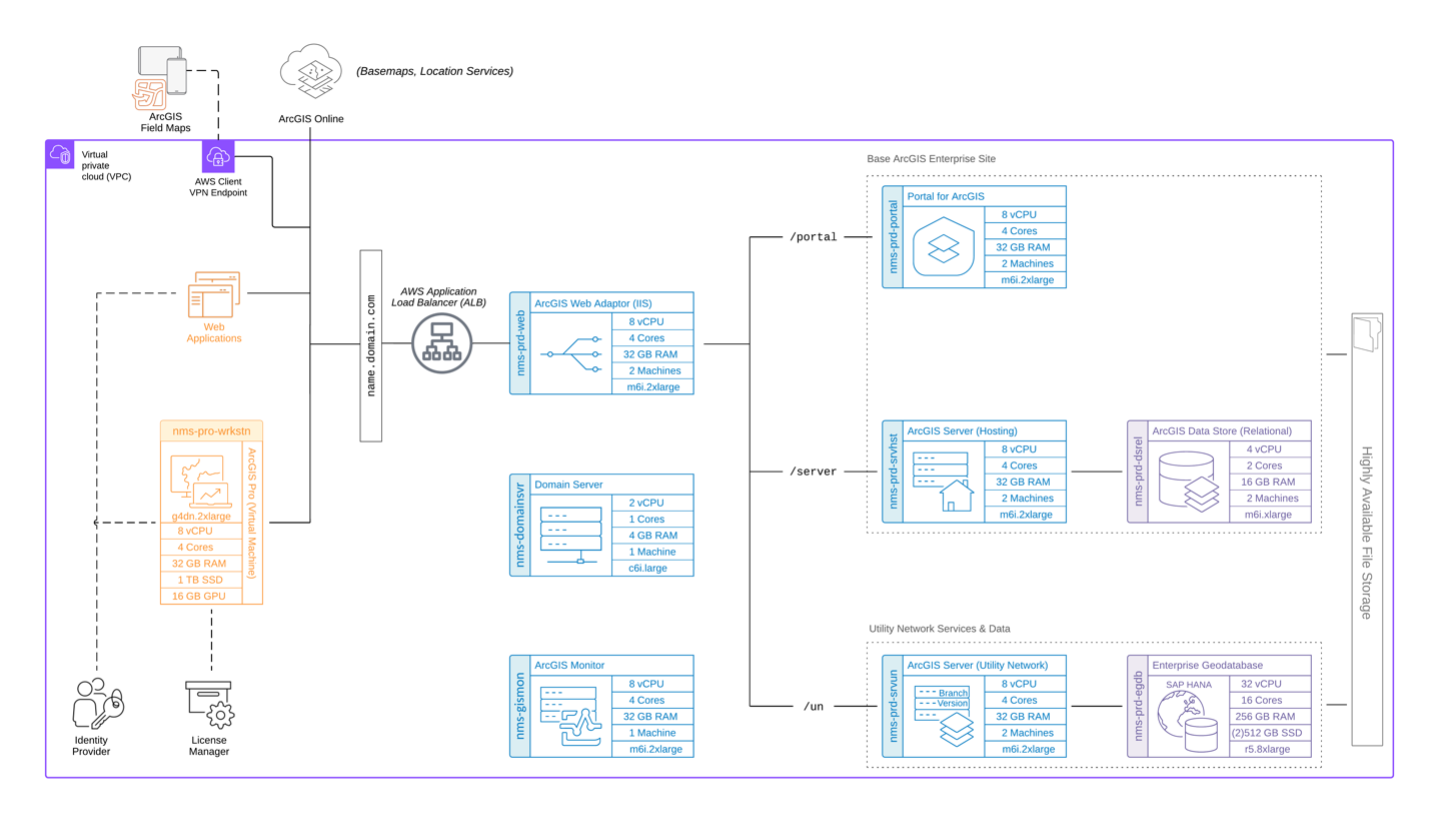Physical architecture
To conduct formal testing, the following physical architecture was designed with:
- A small to medium-sized gas utility in mind
- Support for workflows with a target design load of 15 ArcGIS Pro editors, 200 ArcGIS web users (general user personas), and 200 mobile workers.
- An enterprise geodatabase configured on SAP HANA
- AWS cloud infrastructure
The following adjustments identified in pre-testing were made to the final physical architecture you can view below:
- The ArcGIS Web Adaptor instances was sized up from 2 vCPU to 8 vCPU.
- The Portal for ArcGIS instances were sized up from 4 vCPU to 8 vCPU.

The following represent the machine sizes chosen and validated for the scope and purpose of this test study. However, it is highly recommended to follow a complete design process to account for your business and technical requirements.
Desktop (ArcGIS Pro & web apps)
- 3 instances
- G4DN.2xlarge instance type
- 4 CPU (8 vCPU)
- 32 GB RAM
- 16 GB GPU
- 1 TB SSD Disk
ArcGIS Web Adaptor
- 2 instances
- M6i.2xlarge instance type
- 4 CPU (8 vCPU)
- 32 GB RAM
- 128 GB Disk
Portal for ArcGIS
- 2 instances
- M6i.2xlarge instance type
- 4 CPU (8 vCPU)
- 32 GB RAM
- 128 GB Disk
ArcGIS GIS Server
- 2 instances
- M6i.2xlarge instance type
- 4CPU (8 vCPU)
- 32 GB RAM
- 128 GB Disk
ArcGIS Server (hosting server)
- 2 instances
- M6i.2xlarge instance type
- 4CPU (8 vCPU)
- 32 GB RAM
- 128 GB Disk
ArcGIS Data Store (relational)
- 2 instances
- M6i.xlarge instance type
- 2 CPU (4 vCPU)
- 16 GB RAM
- 256 GB Disk
ArcGIS Monitor
- 1 instance
- M6i.2xlarge instance type
- 4 CPU (8 vCPU)
- 32 GB RAM
- 256 GB Disk
File storage
- 1 instance
- C6i.xlarge instance type
- 1 CPU (2 vCPU)
- 8 GB RAM
- 2 TB Disk
Database
- 1 machine
- R5.8xlarge instance type
- 16 CPU (32 vCPU)
- 256 GB RAM
- Two 512 GB Disks
Domain server
- 1 machine
- C6i.large instance type
- 1 CPU (2vCPU)
- 4 GB RAM
- 128 GB Disk
Additional design considerations
A virtual private network (VPN) was introduced to enable secure communications between mobile devices and the network information management system. In this design, the AWS Client VPN endpoint enables mobile devices to connect. The VPN can impact the performance and user experience, with latency being an inherent factor. For more information, see mobile app deployment. Additional approaches to enable external connection are detailed in the ArcGIS Secure Mobile Implementation Patterns technical paper.